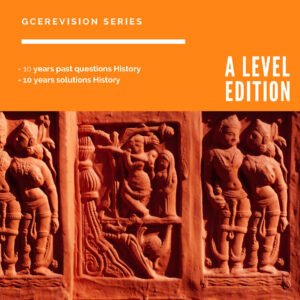Ordinary level 2025 Littoral regional mock history 1
Ordinary level 2025 Littoral regional mock history 1
CAMEROON SINCE 1850
1\. Which of the following Christian Missionary bodies arrived Cameroon before the German annexation of the territory and operated throughout the period of the German rule in the territory? [cite: 173]
[A] The German Basel Mission [cite: 174]
\[B] The Pollotin Fathers
\[C] The English Baptist Missionary Society
\[D] The American Presbyterian Mission
2\.
Which was the most important reason why the British were unable to annex Cameroon in July 1884? [cite: 174]
\[A]
The British gave limited credit to the natives
\[B]
Hewett arrived late [cite: 175]
\[C]
The British Foreign Office was not interested in the annexation of Cameroon
\[D]
The Germans were willing to protect native trade monopoly unlike the British
Question 3 and 4 are based on the following extract of a letter written by Cameroonian coastal chief’s to Queen Victoria of England requesting for the annexation of their territory:
“We your servants have joined together and thought its better to write you a nice loving letter which will tell you all our wishes.
[cite: 176, 177] We wish to have your laws in our towns…….
3\.
In which month and year was this letter written? [cite: 177, 178]
\[A]
August 1879
\[B]
March 1881
\[C]
November 1881
\[D]
March 1883
4\.
Which Cameroon coastal chief led the others in requesting British annexation through this letter?
\[A]
King Pass All
\[B]
King Bell [cite: 179]
\[C]
Jim Ekwalla
\[D]
King Akwa
5\.
The French established trading stations on the eve of the annexation of Cameroon in the following areas EXCEPT:
\[A]
Douala
\[B]
Malimba
\[C]
Big Batanga
\[D]
Campo
6\.
Which German institution replaced the Court of Equity in 1884?
\[A]
Court of First Instance
\[B]
Judicial Council
\[C]
Court of Justice
\[D]
Cameroon Council
7\.
Who was the first appointed German imperial representative in Cameroon following the German annexation of the territory? [cite: 179, 180]
A] Emile Schultz
\[B]
Max
\[C]
Julius Von Soden
\[D]
Von Puttkamer
8\.
Identify the resistance tribes that killed German officers in Cameroon:
A] Bulu and Bangwa
\[B]
Mamfe and Nso
\[C]
Bakweri and Bangwa
D] Nso and Bangwa
9\.
Indicate the resistance leaders who were sent into exile by the German colonial authority:
\[A]
Chief Asonganyi and Chief Tambe
\[B]
Chief Tambe and Kuva Likenye
\[C]
Sembum 11 and Chief Tambe
\[D]
Rudolf Douala Manga Bell and Chief Asonganyi
10\.
The first British-Nigerian forces attack on the Germans in Garoua led to the killing of:
\[A]
Col. Carter
\[B]
Col. Cunliff
\[C]
Captain Von Raben
D] Col.
[cite: 180, 181] Macleans
11\.
The main reason for the defeat of the Germans during the war in Cameroon was because of:
A] native support to the Allies
\[B]
lack of external support to the Germans
\[C]
the blockade of the Cameroon coast
D) German lack of weapons
12\.
Which was the main reason for the failure of the Condominium by 1916?
\[A]
Disagreement between Britain and France over the Authority issue
\[B]
Differences in Colonial policies
\[C]
The Territorial issue
\[D]
Financial issue
13\.
Identify the year in which the British colonial policy of Indirect Rule was introduced.
[cite: 181]
\[A]
1925
\[B]
1922
\[C]
1924
\[D]
1919
14\.
Who was the first British official to serve as “Resident” in the Cameroon Province during the Mandate period?
\[A] Macpherson
15\.
Indicate the name of the Constitution drawn in 1922 which granted British Cameroon one seat in the Nigerian Legislative Council [cite: 181]
A Macpherson Constitution
\[B]
Lyttleton Constitution
\[C]
Richard Constitution
\[D]
Clifford Constitution
Question 16 is based on the following statement concerning the treatment given by the French colonial authorities to a local Cameroonian traditonal ruler [cite: 181]
“In 1931, after it was apparent that he supported passive resistance by his loyal followers against the colonial administration, the French exiled him to Yaounde and he later died in 1933 as an unhappy sovereign”.
[cite: 181, 182]
16\.
Identify the personality referred to in the passage
A] Sultan Ibrahim Njoya of Bamum [cite: 182]
\[B]
Chief Charles Atangana of Ewondo
\[C]
Karnou leader of the Gbaya
\[D]
King Betote Akwa of Douala
17\.
Which of these towns served as the training centre for nurses in French Cameroon during the Mandate period? [cite: 182, 183]
\[A]
Yaounde [cite: 183]
\[B]
Garoua
\[C]
Ayos
\[D]
Foumban
18\.
Identify the name of the military Commander dispatched to French Cameroon by General Charles De Gaulle to overthrow the Pro-Vichy administration there in 1940.
[cite: 183]
\[A]
Marshall Petain
\[B]
Col.
[cite: 183] Philippe De Clerc
\[C]
Gen.
[cite: 183] Joseph Aymerich
\[D]
Admiral Planton
19.
Questions 19 and 20 are based on the extract below:
“The Union des Population du Cameroun (UPC) party while winning the popular support of Southern Cameroonians was banned by the French and British colonial authorities.
[cite: 184]
20.
In what year was the UPC political party firstly banned in French Cameroon? [cite: 184, 185]
JA 1955 [cite: 185]
\[B]
1956
\[C]
1957
D2958
21\.
Identify the new Southern Cameroon political figures who served as Prime Minister and Vice President of the Federal Republic of Cameroon simultaneously.
[cite: 185, 186, 187]
JAE.M.L.
[cite: 186, 187] Endeley and J.N. Foncha
\[B]
Foncha and A.N. Jua
\[C]
Endeley and S.T. Muna
\[D]
J.N. Foncha and S.T. Muna
22\.
Who was the first Prime Minister of East Cameroon State?
\[A]
Andre Marie Mbida
\[B]
Charles Assale
\[C]
Simon Achidi Achu
\[D]
Guillaume Bwele
23\.
As contained in the 1972 Constitution, the ….. succeed the President in case of a power vacuum
\[A]
The President of the House of Assembly
\[B]
The Prime Minister
\[C]
The Minister of Territorial Administration
\[D]
The Vice President assumes the President’s capacity
24\.
….. party politics was abolished in Cameroon inc.
[cite: 187]
\[A]
1961 and 1990
\[B]
1965 and 1991
\[C]
1966 and 1990
\[D]
1966 and 1992
25\.
Identify the year Pope Benedict XVI visited Cameroon
A] 2005
\[B]
1985
\[C]
1995
\[D]
2009
AFRICA SINCE 1884 (Excluding Cameroon)
26\.
The following are the features of the scramble for Africa EXCEPT:
A] European powers signed treaties of free trade and protection with African rulers
\[B]
Europeans used diplomacy in the occupation of Africa
\[C]
Disputes and clashes occurred between European imperialists
\[D]
Raw materials were in abundance in Africa [cite: 187, 188]
27\.
The following events led to the summoning of the Berlin West African Conference EXCEPT:
Al The British occupation of Egypt
\[B]
The French activities in the Niger Delta
\[C]
The Anglo-Portuguese rivalry over the Niger Delta
28\.
Europeans came to acquire territories in Africa.
[cite: 188] It was achieved through African treaties of free trade, protection and friendship
28.
Identify the method above
\[A]
Signing of Treaties
\[B]
European diplomacy
\[C]
Military Conquest
\[D]
Company rule
29\.
A major problem encountered by the Europeans during the penetration and occupation of African territories was:
A] Poor topography in the interior of Africa
\[B]
Stiff resistance from the African rulers
\[C]
Harsh tropical climate infested with diseases
\[D]
Lack of communication with the African rulers
30\.
The West African resistance leader nicknamed as the “Black Napoleon” because of his military resilience in the 1880s and 1890s was:
\[A]
Samori Toure
\[B]
Shaka Zulu
\[C]
Menelik II
\[D]
Prempeh I
Question 31 to 33 are based on the list of colonial policies of administration numbered and the colonies in which they were practised.
[cite: 188, 189]
The following table: [cite: 188, 189]
| | COLONIES |
| :— | :———————- |
| 1\. | Assimilation |
| 2. | Indirect Rule |
| 3. | Protectorate |
| 4. | Paternalism |
| 5\. | Economic exploitation |
| A | Belgian Congo |
| :-: | :——————— |
| B | Nigeria |
| C | Senegal |
| D | Union of South Africa |
| E | Mozambique |
31\.
Identify by letter and the colony in which the policy numbered 4 was practised.
[cite: 189]
A. E.
[cite: 189] Mozambique
\[B]
C.
[cite: 189] Senegal
\[C]
A.
[cite: 189] Belgian Congo
IDI B.
[cite: 189] Nigeria
32\.
The number and the corresponding colonial policy of administration which was practised in the territory lettered C was
\[A]
2.
[cite: 189] Assimilation
\[B]
1.
[cite: 189] Indirect Rule
C) 4.
[cite: 189] Paternalism
\[D]
3.
[cite: 189] Protectorate
33\.
Africa and Africans were involved in the Second World War because of the following reasons EXCEPT: [cite: 189, 190, 191]
\[A]
To prevent the Axis Powers from gaining control of North Africa
\[B]
To prevent the Axis Powers from making use of the oil resources in North Africa
\[C]
To enable the Axis Powers to gain control of the Suez Canal
\[D]
To assist the dethroned Emperor Haile Selassie of Ethiopia
34\.
The first French West African territory to gain independence in the 1950s was
\[A]
Ivory Coast
\[B]
Benin
\[C]
Senegal
D Guinea Conakry [cite: 191]
Question 35 is based on the statement below made by a prominent West African nationalist:
“.[cite: 193]…….. The independence of Ghana is meaningless unless it is linked to the total liberation of Africa…….
35\.
Who was the West African nationalist who made this statement? [cite: 193, 194]
A] Kwame Nkrumah [cite: 194]
\[B]
J.
[cite: 194] B Danquah
\[C]
Sekou Toure
\[D]
Nuamdi Azikiwe
36\.
Indicate the month and year the African Union came into existence.
[cite: 194, 195]
\[A]
June 2006
\[B]
July 2002 [cite: 195]
C] July 2001
\[D]
August 2003
37\.
The major reason for frequent military takeovers in Africa is:
\[A]
Corruption
\[B]
Dictatorship of Civilian leaders
\[C]
Economic mismanagement
D] Political infighting among some political leaders
38\.
The first Prime Minister of the Federation of Nigeria at independence was:
\[A]
Nnamdi Azikiwe
\[B]
Sir Ahmadu Bello
\[C]
Obafemi Awolowo
D] Sir Abubakar Tafewa Balewa
Question 39 is based on this extract from an oath taken by the Kikuyu fighting against British colonial rule: [cite: 195, 196]
“If I become an enemy of my hand and people, let this meat and blood kill me straight away…… If I am ever tempted to abandon any people, let this meat kill me” [cite: 196]
39\.
What was the name of the movement that administered the oath to its members? [cite: 196, 197]
\[A]
The Young Kikuyu Association
\[B]
Kenya African Union
\[C]
The Mau-Mau society [cite: 197]
\[D]
Kikuyu Central Association
40\.
The African city which serves as the headquarter of African Union (AU) is:
\[A]
Addis Ababa [cite: 197]
\[B]
Lagos
\[C]
Dar es Salam
\[D]
Khartoum
41\.
Identify the country which joined the Triple Alliance but fought on the side of the Triple Entente during the First World War
A] France
\[B]
Austria
\[C]
Italy
D] Russia
Question 42 is based on the treaties dealing with defeated nations after the First World War: [cite: 197, 198]
1. Treaty of Versailles
2. Treaty of St.
[cite: 198] Germain
3. Treaty of Laussane
4. Treaty of Trainon
5. Treaty of Neuilly
42\.
Which treaties were imposed on Bulgaria and Hungary respectively? [cite: 198]
\[A]
1 and 4
\[B]
5 and 4 [cite: 198]
C] 3 and 2
\[D]
4 and 3
43\.
Identify the territories given to Belgium by the Treaty of Versailles in 1919.
[cite: 198]
A] Sardina and Rhineland
\[B]
Northern Schleswig
\[C]
Eupen and Malmedy [cite: 198]
\[D]
Polish Corridor
44\.
The organ of the League of Nations created to promote better working conditions for workers in the world was: [cite: 198, 199]
\[A]
Economic Commission
\[B]
Disarmament Commission
\[C]
The Mandate Commission
45\.
Which of the following powers adopted the policy of Appeasement in the 1930s?
46\.
Identify the event that marked the origins of the Second World War in 1939
The following were the reasons for the success of the League of Nations EXCEPT: [cite: 199]
A Financial support from the USA and Russia [cite: 199]
\[B]
The absence of aggressors
\[C]
Harsh sanctions given to the defeated Central powers by the Allies
\[D]
It was a newly created international organisation
48\.
Which organ of the UNO applies sanctions on aggressive nations? [cite: 199, 200]
\[A]
The Genaral Assembly
\[B]
\[The Secretariat
\[C]
The Security Council [cite: 200]
(D) The International Court of Justice
49\.
When was the Green Tree Agreement that finally resolved the Bakassi Crisis between Nigeria and Cameroon signed? [cite: 200, 201]
A] 12th June, 2004
\[B]
12th May, 2006
\[C]
14th April, 2006
\[D]
12th June, 2006 [cite: 201]
50\.
The following are some causes of frequent refugee problems in the World EXCEPT:
\[A]
Drug abuse [cite: 201, 202]
\[B]
Wars
\[C]
Natural disasters
\[D]
Desertification














